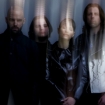"I like horror movies that have a degree of coziness to them," says Ghost mastermind Tobias Forge when Revolver catches up with him on tour in El Paso, Texas. "Even Friday the 13th and Halloween have a little bit of a cozy nature. I love that street in [fictional Halloween locale] Haddonfield, Illinois — even if it's really in Hollywood. I love that all-American, autumnal street with the trees and the leaves. I always longed to go to a street like that in October and go down to someone's dad's TV room with the wooden panels and watch a film."
While Forge has endless enthusiasm for the classics of the Seventies and Eighties, most modern horror films don't do much for him. "I must say that I'm not very fond of new horror films at all," he says. "I never, ever, wanna see The Conjuring again — ever. I don't wanna see Annabelle again. Most of the films I've seen that are new, I don't wanna see again because there's no safe haven. There's nothing cozy about them whatsoever. And I think that's something that's truly gone amiss in modern horror filmmaking and is ever so present in the films I've mentioned and want to mention."
He does see some hope, though: "Lately, there seems to be a resurgence in what I like about older horror films, so I think some directors may have picked up on it. It may have started a few years ago with The House of the Devil. A more recent example is Stranger Things, where they've combined horror with the feel-good vibe of the Seventies and the Eighties."
Of course, Ghost has catapulted to fame by capturing much of what heavy metal and horror fans love about those bygone eras and giving it a melodic, modern makeover. In that spirit, we asked Forge about the cinematic inspiration that lurks behind the monster he's created.
5. 'Halloween II'
"These are great representations of the feel-good slasher film. I'm a big fan of the first one, but one of the first horror films I ever saw on my own was Halloween II. That was my first real experience of Halloween as a concept because in Sweden in the Eighties, we didn't celebrate Halloween. We have All Hallows' Eve, but that's a completely different thing. The pumpkins and trick or treating, that was something that was embraced in the early Nineties and onwards. It was basically my generation — people who were 15 or 16 in the mid-Nineties — who did that. We saw that as an excuse to have a theme party around the time of All Hallows' Eve, and it's still one of my favorite times of year. If you go to Sweden at that time of year now, it'll be very Halloween-y. But thirty years ago it wasn't, so when I saw Halloween II in '87 or something like that, it felt very foreign. And because I'm an Americophile, it definitely contributed to my longing to go to America. Even with this man fucking that night up, I still wanted to go to Haddonfield, Illinois, and just hang out. I should also mention that I went to see the new Halloween, and I liked it. I'd see it again."
4. 'The Omen'
"I think you need to see parts one, two and three of The Omen. And then just skip the ending of number three — it's so bad it makes me want to put my foot through the TV. [Laughs] It's got all the things I [like] about in The Exorcist, but even more so. As a teenager who felt somewhat on the outside of the norm — especially imagining being in touch with higher powers — obviously Damien Thorn was a very sympathetic figure. [Laughs] And the idea of being the one appointed antichrist, destined to greater things, was of course very much in line with my 13-year old self.
"The Omen is an interesting social comment. If you regard the idea of Damien Thorn as an industrial magnate granted these powers in order to basically take over the world with very evil intentions, it's easy to draw parallels to a lot of contemporary things that we know of, which makes the film even better. It's a great story of evil coming to power. You might wanna go presidential on that one.
"I think there's a lot to learn from The Omen series. That speech Damien has in front of the Jesus statute in Part III — if you revisit that, you'll notice that I've stolen a lot of the things he says there because it's so powerful. There's so many things being said about the devious nature of religion, and Damien Thorn is pointing those things out — the sanctimonious nature of what is supposed to be the good side, but it's not really the good side. Historically speaking, Christianity is not a trail of happiness. It's a trail of tears and blood and terror. That's why the end of the third film is so unmotivated. They've already explained that the Christian, God-fearing side is not the good side. So the ending is a contradiction.
"To me, the devil is a symbol for liberation. He's a symbol for intellectualism. He's a symbol for art and expression and sexuality and freedom. If you look around in the world, the people who argue for the "good side" are more or less against all those things. So who's the bad guy? The Omen series explains that brilliantly."
3. 'Jaws'
"Jaws has everything — a dangerous meat-eating creature lurking in the ocean, and Amity is a very cozy little town. I'd love to sit in Chief Brody's house looking out over the water. The characters also have a lot of character, which you don't see often in horror films. You've got the conflict of having moved to a new place, the conflict of being parents, the conflict of doing the right thing while you're being told to do the wrong thing in the interest of commerce — the whole conflict between Chief Brody and the mayor. There're so many layers; it's fantastic. And it's such a good story about this fucking fish that threatens to kill whole town because tourism will go away.
"I saw Jaws when I was maybe five or something like that. [Laughs] My dad is now retired, but he was a photographer and also did a lot of documentary films. He was very keen on explaining films to me. He had all these issues of American Cinematographer magazine, which talked about all the groundbreaking movies that were being made at the time — Jaws, Star Wars, E.T. So he explained to me that a lot of Jaws was really just underwater filming, mostly of vegetation. The only thing that makes you think it's scary is the music. That's what makes you think is a shark there. That's the magic of film."
2. 'The Exorcist'
"As a teenager and pre-teen, I was very fascinated with the idea of Satan and possession and the powers of the dark side. The Exorcist embraced all of those things. You had this demon who could do magical things in the name of Satan, and that just struck a chord with me. I probably first saw it when I was 11 or 12, which is when I was getting deeply into the idea of embracing Satan's character. As I've seen it many more times over the years, it really stands out as a fantastic film. And again, even though most of the film is very troubled, it has that autumnal quality. I guess it takes place in Washington [D.C.] and it's really cozy. They live in a really nice house."
1. 'The Shining'
"I'd say this is the best horror film ever made. This might be a taste thing, but I'm very much a fan of alpine living — I like wooden houses buried in snow on a mountain. The Shining obviously has a lot of that. And there's something about the Overlook Hotel — it's frightening and huge, yes, but there's still something about it that seems very hospitable. The film also gives us a throwback to a time when there were a lot of people there — it had grandiose days in the past when it was very alive and vibrant. Nowadays, when horror films do throwbacks, the past is equally dark and menacing."








